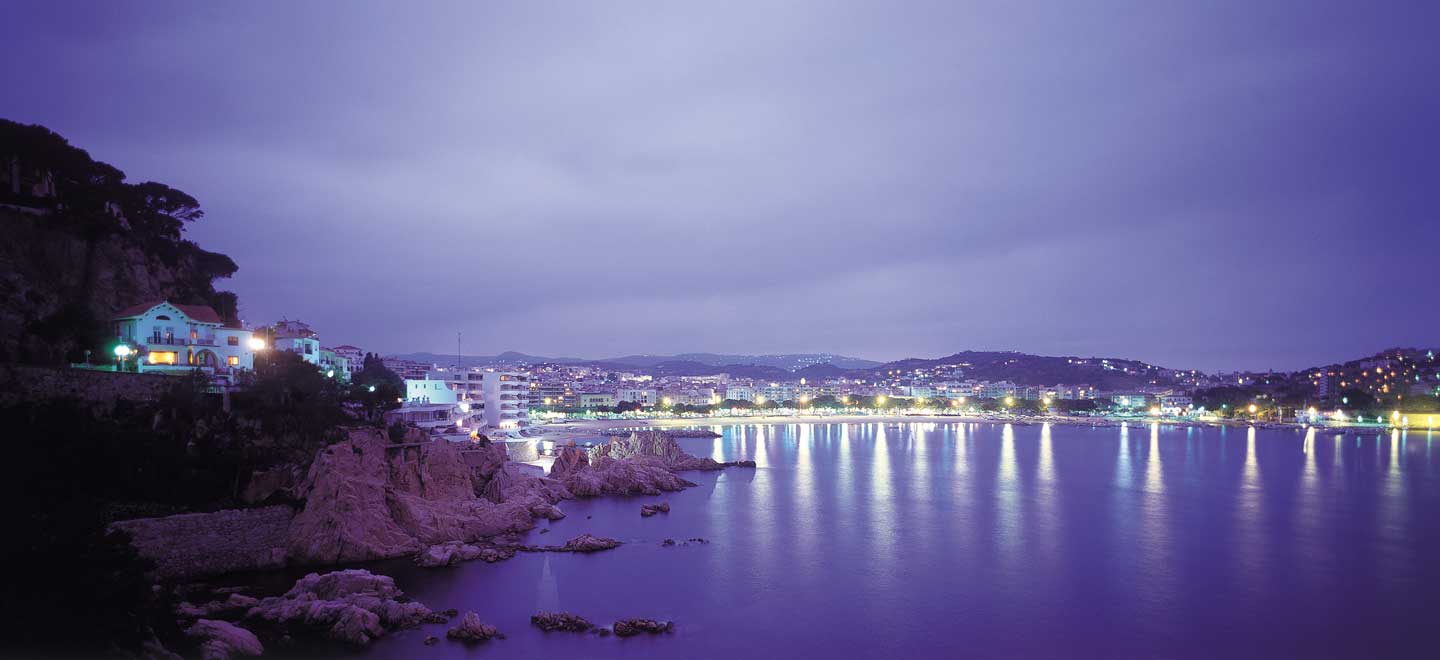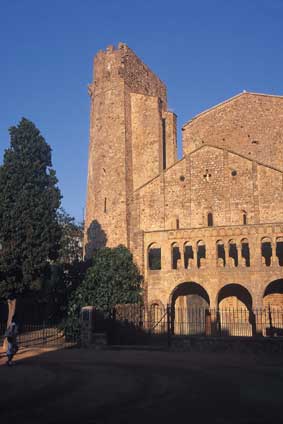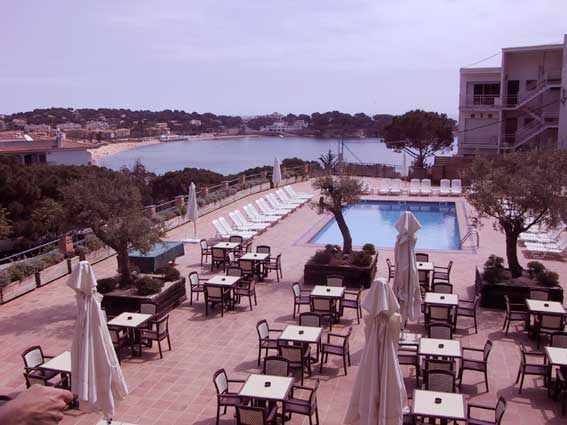 |
|
 |
 |
|
 |
The 2004 European School of High-Energy Physics (formerly the CERN-JINR School of Physics) will be jointly organized by the Joint Institute for Nuclear Research (JINR), Dubna, Russia, and the European Organization for Nuclear Research (CERN), Geneva, Switzerland together with the Institut de Física de Altes Energíes (IFAE) of the Universidad Autónoma de Barcelona, Spain.
The basic aim of the School is to teach various aspects of high-energy physics, but especially theory and phenomenology, to young experimental physicists, mainly from the Member States of CERN and of JINR.

Sant Feliu
The Schools of Physics are designed to give a survey of up-to-date information, rather than to be a training course. An outline of each of the lecture courses and reading lists will be published on the web.
Date and Place of the School
Accommodation
Scientific Programme
Discussion Sessions
Language
Proceedings
Travel
Cost
Participation
Application
Organizing Committee
Enquiries and correspondence
Poster for the School (PDF format, 1.6 Mb) Poster
Date and place of the School
The Twelfth European School of High-Energy Physics will be held from May 30 to June 12, 2004 in Sant Feliu de Guíxols. The lectures will be given in the chapel of the 10th century monastery, which is part of the School of Tourism of the University of Girona and is downtown Sant Feliu.

The Monastery
Sant Feliu (www.guixols.net) is a small resort town on the Costa Brava, about 110 km from Barcelona. The surrounding coastline is full of contrasts, with stretches of cliffs interrupted by coves and bays with fine sand beaches. The town has significant cultural and architectural attractions, while also offering marine activities and water sports. The countryside around Sant Feliu, with its Mediterranean pine and oak woods, is particularly attractive to bikers and hikers.

The multifarious attractions of Barcelona, one of the great European capitals and a major centre of business, culture, art, history and tourism, are described in numerous guidebooks. See www.bcn.es for starters.
The weather in early June on the Costa Brava and in Barcelona is sunny and warm (24-30 degrees C).
Accommodation
The entire Hotel S’Agaró Mar, situated in Sant Feliu at walking distance from the lecture hall, has been reserved for the School’s students, faculty and staff. Breakfast and dinner will be served in the Hotel. Lunch tickets to restaurants in Sant Feliu will be provided. (See www.ghthotels.com, click on Hotel S’Agaró Mar)
The hotel, totally renovated in 2001, is 100 m from the Sant Pol beach. It is surrounded by pine trees and has beautiful sea views; its services include an outdoors swimming pool and a bar. Students will share double rooms with bathroom, TV and telephone.
Discussion sessions will take place in the Hotel, which will be equipped with computing and electronic communication facilities.

Hotel terrace
Scientific programme
The preliminary scientific programme is as follows:
| Field Theory and Standard Model | A. Pich (IFIC - U. de València) |
| QCD | M. Seymour (U. of Manchester and CERN) |
| Flavour Physics and CP Violation | A. Buras (Technical University, Munich) |
| Beyond the Standard Model | D. Kazakov (JINR, Dubna) |
| Neutrinos | C. Gonzalez-Garcia (SUNY - Stony Brook and IFIC - U. de València) |
| Quark Deconfinement & Nuclear Collisions | H. Satz (Universität Bielefeld) |
| Accelerators | K. Hübner (CERN) |
| Cosmology & Astrophysics | J. Garcia-Bellido (U. Autónoma, Madrid) |
There will be thirty three lectures in all, each lasting about 75 minutes, with additional time for questions and discussion.
Students will be encouraged to present their current research work in the form of a special poster session which is planned for Thursday June 3.
Draft Programme
Discussion Sessions
Discussion sessions, which are intended to clarify points which may be obscure from the lectures, will be held most afternoons and will last about 75 minutes.
The discussion sessions will be led by:
| V. Bednyakov | JINR, Dubna |
| A. Donini | U. Autónoma, Madrid |
| T. Feldmann | CERN |
| R. Fleischer | CERN |
| A. Santamaria | IFIC - U. de València |
| O. Vives | CERN |
Language
The working language of the School will be English. Participants should therefore have a good understanding of English to enable them to benefit from the School.
Proceedings
The School Proceedings will be published as a CERN Yellow Report in 2005. Each participant will receive one copy free of charge.
Proceedings from earlier schools are available at Proceedings2002 , Proceedings2001 , Proceedings2000 and Proceedings1999.
Travel
Students should arrange to arrive in Sant Feliu de Guíxols for registration during the afternoon or evening of Sunday, May 30. The School will end on the morning of Saturday, June 12 after breakfast.
Barcelona Airport is served by many international airlines.
Participants will be met at the Airport by specially organized buses. Exact times and places will be given in the second bulletin.
Cost
The cost of the School will be around 1500 Swiss Francs per student, and will cover tuition, board and lodging from dinner on Sunday 30 May to breakfast on Saturday 12 June , 2004, as well as coffee, tea or cold drinks during the morning and afternoon breaks and some social activities. It does not include travel expenses from participants' home institutes to Sant Feliu and back.
For participants from JINR and CIS there are special arrangements for paying the School Fee and for travel. For further information, please contact the JINR Organizing Secretary, Mrs. T.S. Donskova (see Enquires and Correspondence below).
It is hoped that INTAS (the International Association for the Promotion of Cooperation with Scientists from the Independent States of the former Soviet Union) will provide funds for students working in former Soviet Union countries.
Details concerning the method of payment of the Fee will be published in the second Bulletin.
Participation
The School is open to young physicists, preparing a PhD or equivalent in high-energy physics, with at least one year's experience working as experimentalists. The number of students will be about 100, mostly from the CERN and JINR Member States, but a few may come from other countries which are not members. Personal contacts and informal discussions among the participants during leisure time are an important aspect of the School. For this reason, participants are asked to note that they should not be accompanied by family members or friends.
Application
Applications to attend the School should include:
- a completed application form
- a 100-word summary of current work
- a letter of reference and ranking from the candidate's professor or supervisor
The application form for the 2004 European School of Physics should be completed and sent as soon as possible and must be received by the closing date of 18 January, 2004. A few additional applications may be accepted on a first come first serve basis up to the selection meeting on 9 February.
The 100-word summary should be sent by completing the appropriate section in the Web application form.
The submission of the completed application form must be accompanied in parallel by a letter of reference and ranking from the student's professor or supervisor (signed and dated hard copy with letterhead of referee's institution). Applications without a reference letter will not be considered. The professor or supervisor's name and the date of the reference letter should be indicated in the appropriate boxes on the Web application form; and the letter should be sent to Danielle Métral, the CERN Organizing Secretary (see Enquiries and Correspondence below).
Students who wish to apply but who do not have a suitable browser for the Web application form should request a hard copy of the form from one of the Organizing Secretaries (see Enquiries and Correspondence), stating clearly their name and postal address. Their 100-word summary of current work should be sent by electronic mail to the CERN Organizing Secretary.
Candidates should ensure that their application, letter of reference and 100-word summary reach the CERN Organizing Secretary by 18 January 2004.
The selection of the students will be made by the Organizing Committee; and all applicants will be informed in February 2004 whether or not they have been selected.
Organizing Committee
M. Cavalli-Sforza (IFAE, Barcelona) School Director
M. Aguilar Benitez (CIEMAT, Madrid)
T. Donskova (JINR, Dubna) Organizing Secretary
N. Ellis (CERN)
A. Ferrer (University of Valencia and IFIC)
R. Fleischer (CERN)
E. Lillestol (CERN and University of Bergen)
D. Métral (CERN) Organizing Secretary
A. Olchevsky (JINR, Dubna)
R. Pascual (Barcelona UAB and IFAE)
International Advisors
A. Sissakian (JINR, Dubna, Russia)
A. Skrinsky (BINP, Novosibirsk, Russia)
N.E. Tyurin (IHEP, Protvino, Russia)
Enquiries and correspondence
All enquiries and correspondence related to the School of Physics should be addressed to one of the Organizing Secretaries:
| Danielle Métral School of Physics CERN/DSU CH-1211 GENEVA 23 Switzerland |
Tatyana Donskova International Department Joint Institute for Nuclear Research RU-141980 Dubna, Moscow Region Russia |